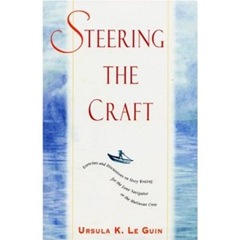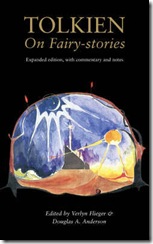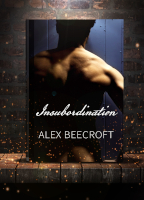Advice from the masters
That branding exercise was a good exercise to do, I think, even if nothing comes of it on the ‘finding your readers’ front. It certainly helped with the ancient Greek principle of “know thyself.”
One thing I did notice was that several people said my fictional worlds felt grounded and real in a way that brought the past (or the fantasy setting) to life. So I thought I would share the advice that I followed in order to achieve that. This is probably the only writing advice about style that I’ve ever made a consistent effort to follow, because the prevalent advice at the moment – to make your language as invisible as you can, so that people only notice the plot – has always struck me as a sad, barren, grey timidity in a language that can provide fireworks if you let it.
Two of my three favourite authors of all time are Tolkien and Ursula LeGuin. (Patrick O’Brian is the third, and although he doesn’t talk about this stuff, his books are hard to jam closed for the exuberance of their language and settings. He practices what the other two preach.) What I like about them all is not just because they have great plots and good characters – it’s because their worlds are lush and sensual and full of juice. You fall into them and you’re there, seeing, smelling, tasting and touching something that never existed at all, and being overwhelmed by it.
I wanted to be able to do that! So naturally when I found out that they had published writing advice, I went and got hold of it. If you’re at all interested in doing the same thing, it’s worth getting hold of it yourself, but in the meantime I’ll pass along a few quotes.
Here’s what Ursula LeGuin has to say in the opening of Steering the Craft
Most children enjoy the sound of language for its own sake. They wallow in repetitions and luscious word-sounds and the crunch and slither of onomatopoeia; they fall in love with musical or impressive words and use them in all the wrong places. Some writers keep this childish love for the sounds of language… Others “outgrow” their oral/aural sense of language as they learn to read in silence. That’s a loss.
Skipping over most of the book, here’s another paragraph that resonates with me:
Crowding is what Keats meant when he told poets to “load every rift with ore.” It’s what we mean when we exhort ourselves to avoid flabby language and cliches, never to use ten vague words where two will do, always to seek the vivid phrase, the exact word. By crowding I also mean keeping the story full, always full of what’s happening in it; keeping it moving, not slacking and wandering into irrelevancies; keeping it interconnected with itself, rich with echoes forward and backward. Vivid, exact, concrete, accurate, dense, rich: these adjectives describe a prose that is crowded with sensations, meanings and implications.
If I join up those two things, I get the advice to enjoy language, play with it, using all of its poetic qualities and techniques wherever you think they’ll enhance the read. But at the same time, keep it concrete, specific and as singular as you can.
Tolkien says something very similar in his essay “On Fairy Stories” (among many other thought provoking things):
The “fantastic” elements in verse and prose of other kinds, even when only decorative or
occasional, help in this release. But not so thoroughly as a fairy-story, a thing built on or
about Fantasy, of which Fantasy is the core. Fantasy is made out of the Primary World, but a
good craftsman loves his material, and has a knowledge and feeling for clay, stone and wood
which only the art of making can give. By the forging of Gram cold iron was revealed; by
the making of Pegasus horses were ennobled; in the Trees of the Sun and Moon root and
stock, flower and fruit are manifested in glory.
And actually fairy-stories deal largely, or (the better ones) mainly, with simple or
fundamental things, untouched by Fantasy, but these simplicities are made all the more
luminous by their setting. For the story-maker who allows himself to be “free with” Nature
can be her lover not her slave. It was in fairy-stories that I first divined the potency of the
words, and the wonder of the things, such as stone, and wood, and iron; tree and grass; house and fire; bread and wine.
Which I take to mean “remember that even the simplest things in your fictional world – the sea, the rain, the tea-cup in your character’s hand, reflect things in our own world which are real, and remarkable. There is a kind of miracle in the existence of anything at all, and in the same way everything that you put into a book is something created out of nothing.” The details of your fictional world are little marvels of creation and ought to be treated as (as LeGuin says) “Vivid, exact, concrete, accurate, dense, rich.” In your subcreated world, all the things are real things, which you summoned out of non-existence with your mere words. It’s well worth treating them with the kind of care you would give to anything magical, potent and strange.
A writer can draw your attention to grass in their imaginary world in such a way that when you come back, you see grass in your own land as the remarkable and peculiar thing that it is. The pundits may tell you that everyone knows what grass looks like, so just drop the word and move on. But it’s not so – few people have the time to really notice grass. If you do it for them, you can give them back some of their childish wonder at how amazing everything is. So don’t just drop the word ‘grass’ and move on. Take the time to notice whether it’s close cropped, hair fine grass, striped in two greens, or long, coarse grass with moss and dandelions, just turning blond in the summer heat. Your worlds will be better for it and you may end up working enchantment.
That’s the theory, anyway. I don’t think I match up to it yet, but I try.



re. grass (because that’s where you ended up, sort of). I used to interpret the word “lawn” as “area of grass”, until a few years ago when my grandad said he’d “never had a lawn, but always had a good bit of grass in the garden”.
So just using one word might not work anyway, as your reader may interpret it in a different manner to your intention, so description is needed, as you point out above.
Also, thanks for the info, I’d heard of (and possibly read) On Fairy Stories, but not Steering the Craft 🙂
I would probably use ‘lawn’ to mean ‘area of grass’ as well, but that’s because I’ve never aspired to a proper weed-free bowling-green type lawn. Something to lie on on a summer day is fine for me. But yes, the more specific you get, the less you should cause that kind of confusion.
Steering the Craft is lovely and makes you want to write, which is more than most how to write books do!